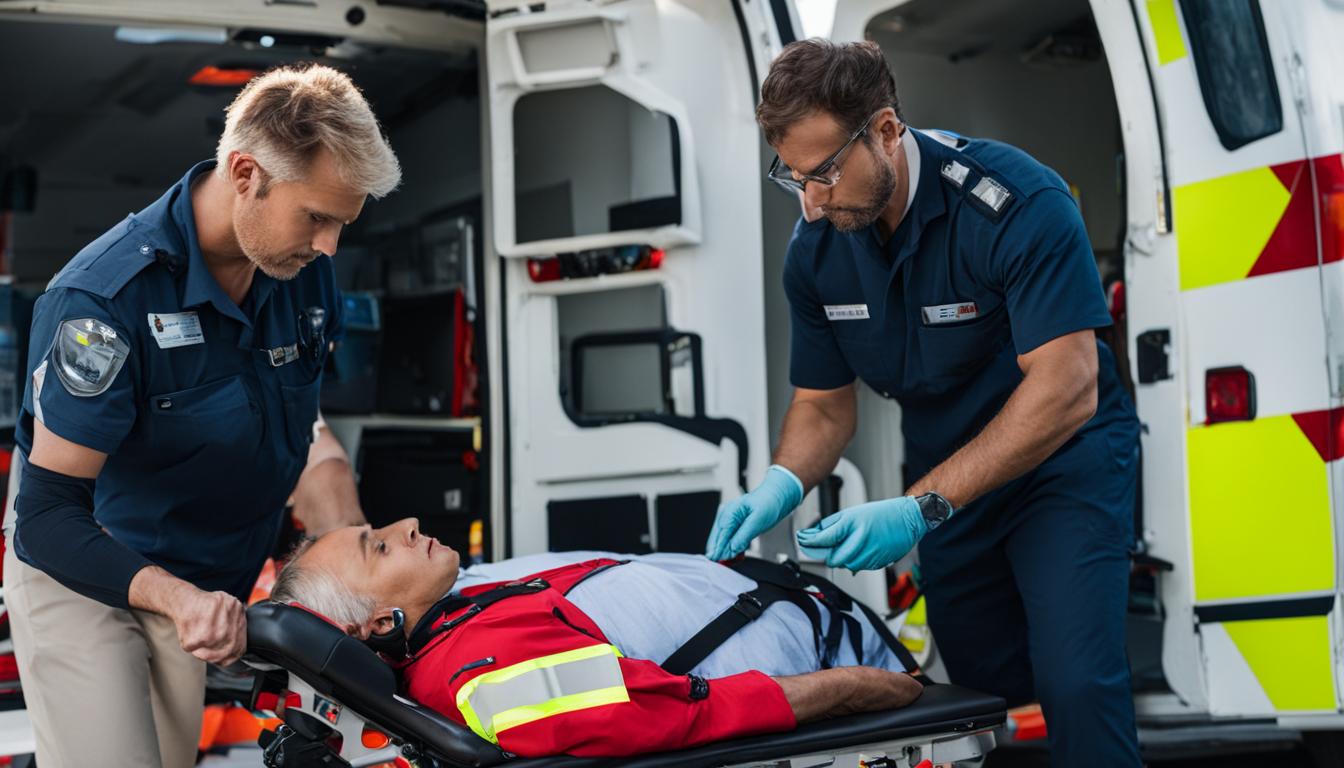Reliable Emergency Assistance Services for Your Urgent Needs

In times of crisis, it’s essential to have reliable emergency assistance services to turn to. Whether you need help with homelessness, domestic violence, or mental health issues, there are various helplines, directories, and support organizations available to provide immediate aid. These services can connect you with housing assistance, access to healthcare, food, crisis counseling, and more.
Key Takeaways:
- During a crisis, having reliable emergency assistance services can make all the difference.
- Helplines, directories, and support organizations offer immediate aid for homelessness, domestic violence, and mental health issues.
- These services connect individuals with housing assistance, healthcare access, crisis counseling, and more.
- Emergency assistance services are available to provide help during urgent needs.
- Remember, you are not alone, and help is always within reach.
Getting Immediate Assistance through 24/7 Emergency Services
In times of crisis, immediate assistance is crucial. That’s why 24/7 emergency services play a vital role in providing urgent aid to those in need. Whether it’s a medical emergency, domestic violence situation, or any other urgent matter, these services are available around the clock to offer help and support when it’s needed most.
One of the easiest ways to access immediate assistance is by dialing 2-1-1. This free and confidential referral service connects individuals to a wide range of programs and resources. From housing assistance to healthcare and food support, 2-1-1 can help connect you to the services you require in your area.
“When seconds count, 2-1-1 is there to provide the assistance you need.”
Additionally, specialized helplines like the National Domestic Violence Hotline and the 988 Suicide & Crisis Lifeline are available 24/7 to provide confidential crisis intervention and safety planning. These hotlines are staffed with trained professionals who can offer support, guidance, and resources tailored to your specific situation.
| Emergency Service | Contact Information |
|---|---|
| National Domestic Violence Hotline | Call: 1-800-799-SAFE (7233) Text: LOVEIS to 22522 |
| 988 Suicide & Crisis Lifeline | Call: 988 Text: TALK to 988 |
Remember, in times of crisis, immediate assistance can make a significant difference. Don’t hesitate to reach out to the appropriate helpline or emergency service when you need it. Help is available, 24/7.

Finding Help for Homelessness and Housing Assistance
If you’re facing homelessness or in need of housing assistance, there are organizations and government programs ready to support you. The Department of Housing and Urban Development (HUD) provides a directory of shelters, helplines, and housing counselors. By searching HUD homelessness resources in your state, you can find additional assistance tailored to your location. Additionally, the PATH providers offer services specifically for individuals experiencing or at risk of homelessness and serious mental illness.
Government Programs for Housing Assistance
If you’re struggling with homelessness or housing insecurity, government programs can provide much-needed support. One such program is the Emergency Solutions Grants (ESG), which helps individuals and families quickly regain stability through emergency shelter, rapid rehousing, and homelessness prevention services. Another program is the Section 8 Housing Choice Voucher Program, which provides rental assistance to low-income individuals and families, allowing them to afford safe and decent housing in the private market.
In addition to these programs, there are also local resources available that can assist with housing assistance. Local nonprofit organizations often provide emergency shelters, food pantries, and transitional housing to those in need. These organizations work closely with government agencies and community partners to ensure that individuals and families receive the support they need to secure stable housing.
Table: Comparison of Housing Assistance Programs
| Program | Description | Eligibility Requirements |
|---|---|---|
| Emergency Solutions Grants (ESG) | Provides emergency shelter, rapid rehousing, and homelessness prevention services. | Varies by locality, typically targeted at individuals and families experiencing or at risk of homelessness. |
| Section 8 Housing Choice Voucher Program | Provides rental assistance to low-income individuals and families. | Income limits apply, preference given to those with the greatest need. |
| Local Nonprofit Organizations | Offer emergency shelters, food pantries, and transitional housing. | Varies by organization, typically based on need and availability. |
By accessing these resources and programs, individuals and families facing homelessness or housing instability can find the help and support they need to regain stability and secure safe housing. It’s important to reach out for assistance when facing these challenges, as there are dedicated organizations and agencies ready to help.

Don’t Give Up: Seeking Assistance is a Step Towards a Better Future
“Homelessness can happen to anyone, but it doesn’t define who you are. Reach out for help, and together we can find a path forward.” – Anonymous
Remember that seeking assistance for homelessness or housing assistance is not a sign of weakness; it’s a courageous step towards a better future. No one should have to face these challenges alone, and by utilizing the available resources and support networks, you can find the help you need to rebuild your life. Reach out to local organizations, government agencies, and helplines to start your journey towards stable housing and a brighter future.
Support for Domestic Violence Victims
Domestic violence is a serious issue that requires immediate attention and support. If you or someone you know is experiencing domestic violence, there are resources available to provide crisis intervention and safety planning. The National Domestic Violence Hotline is a 24/7 helpline where trained advocates offer confidential support and assistance. By calling 1-800-799-SAFE (7233), you can speak to an advocate who can help you develop a safety plan and connect you with local agencies and resources.
In addition to the National Domestic Violence Hotline, several organizations specialize in supporting domestic violence victims. One such organization is the National Network to End Domestic Violence (NNEDV), which works to provide resources, advocacy, and tools to survivors and individuals working to end domestic violence. Their website offers extensive information on safety planning, legal rights, support networks, and more.
“No one deserves to live in fear. Reach out for help – you are not alone.”
Domestic violence situations can be complex and dangerous, so it is crucial to prioritize your safety. If you are in immediate danger, it is recommended to use a public computer or phone to access these resources. Remember, help is available, and you have the right to live a safe and violence-free life.
Suicide Prevention and Mental Health Support
In times of emotional distress or suicidal thoughts, it is crucial to have access to immediate support and crisis counseling. Suicide prevention and mental health services play a vital role in providing the necessary assistance and guidance for individuals in need. The 988 Suicide & Crisis Lifeline and the Veterans Crisis Line are two essential resources that offer confidential and compassionate help to those struggling with their mental well-being.
Through the 988 Suicide & Crisis Lifeline, individuals can connect with trained crisis workers who are available 24/7 to listen, provide support, and offer crisis counseling. This lifeline ensures that calls are directed to the nearest crisis center, ensuring immediate assistance for those in distress. Whether you’re experiencing overwhelming emotions or need someone to talk to, the 988 Suicide & Crisis Lifeline is there to provide the help you need.
For veterans facing crisis situations, the Veterans Crisis Line offers specialized support tailored to their unique needs. This confidential helpline provides assistance with issues such as mental health concerns, homelessness, and access to crucial services. By reaching out to the Veterans Crisis Line, veterans can access the support they need from knowledgeable professionals who understand their specific challenges and experiences.
“You are not alone. There are resources available to help you through these difficult times. It’s important to reach out and ask for support.”
Key Takeaways:
- The 988 Suicide & Crisis Lifeline is a valuable resource for individuals in emotional distress or experiencing suicidal thoughts.
- Crisis workers are available 24/7 to provide compassionate support and crisis counseling through the lifeline.
- The Veterans Crisis Line offers specialized assistance for veterans facing crisis situations, including mental health concerns.
- Both helplines provide confidential support to ensure the well-being of individuals in need.
| Lifeline | Services Offered | Contact Information |
|---|---|---|
| 988 Suicide & Crisis Lifeline | – Immediate crisis counseling – Emotional support – Referrals to local resources |
Dial 988 |
| Veterans Crisis Line | – Specialized assistance for veterans – Help with mental health concerns, homelessness, and more – Referrals to VA services |
Call 1-800-273-8255 and press 1 Text 838255 |
Assistance for Veterans in Crisis
When veterans find themselves in crisis situations, it is essential to know that there are dedicated helplines and resources available to provide free and confidential assistance. These support systems understand the unique challenges faced by veterans, offering guidance, information, and referrals to help navigate difficult circumstances. By reaching out to the National Call Center for Homeless Vets or the Veterans Crisis Line, veterans can access the help they need in a time of crisis.
The National Call Center for Homeless Vets provides comprehensive assistance to homeless veterans, offering information on homeless prevention programs, emergency housing, and mental health services. They can also connect veterans with resources for employment, healthcare, and other crucial needs. This helpline ensures that homeless veterans have access to the support and resources necessary to regain stability in their lives.
The Veterans Crisis Line is another important resource that offers confidential support to veterans in crisis. Trained professionals are available 24/7 to provide immediate assistance, crisis counseling, and safety planning. The hotline ensures that veterans in distress can receive the urgent care they require, connecting them to local resources and services specifically tailored to their needs.
Mental Health Services for Veterans
Mental health is a critical component of overall well-being, and veterans face unique challenges in this area. Fortunately, there are specialized mental health services available to provide the support veterans need. The Department of Veterans Affairs (VA) offers a wide range of mental health programs and services, including counseling, therapy, and treatment for post-traumatic stress disorder (PTSD), depression, and other mental health conditions. Veterans can reach out to their local VA facility or access the VA’s Mental Health Services online for more information on the services available to them.
| Service | Description |
|---|---|
| Counseling Services | The VA provides individual, group, and family counseling to address a range of mental health issues, including PTSD, depression, anxiety, and substance abuse. |
| Peer Support | Peer support programs connect veterans with other individuals who have had similar experiences, providing a supportive environment for sharing and healing. |
| Residential Treatment | In cases where more intensive care is required, the VA offers residential treatment programs for veterans dealing with severe mental health conditions. |
| Telehealth Services | Through telehealth services, veterans can access mental health care remotely, ensuring they receive the support they need, even if they are unable to visit a VA facility in person. |
Government Programs for Emergency Financial Assistance
During times of financial crisis, it’s essential to know that there are government programs available to provide emergency financial assistance. These programs offer support to individuals and families facing immediate financial hardships and ensure that basic needs such as food, housing, and utilities are met. By accessing these resources, individuals can receive the assistance they need to navigate through challenging times and move towards financial stability.
Temporary Assistance for Needy Families (TANF)
One government program that provides emergency financial assistance is Temporary Assistance for Needy Families (TANF). TANF offers grants to help individuals and families with basic necessities such as food, shelter, and transportation. Eligibility requirements vary by state, but TANF aims to provide temporary financial support to those in need.
Low Income Home Energy Assistance Program (LIHEAP)
Another valuable program is the Low Income Home Energy Assistance Program (LIHEAP). LIHEAP assists individuals and families with reducing their energy bills and making necessary repairs to ensure safe and adequate housing. This program helps alleviate the burden of high energy costs and provides financial relief for those struggling to keep their homes warm in the winter or cool in the summer.
Housing Choice Voucher (Section 8) and Medicare Savings Programs
In addition to TANF and LIHEAP, there are other government programs that offer emergency financial assistance. The Housing Choice Voucher (Section 8) program provides rental assistance to low-income individuals and families, ensuring they have access to safe and affordable housing. Medicare Savings Programs assist eligible individuals with their medical expenses, including premiums, deductibles, and co-payments. These programs help alleviate the financial burden of healthcare costs and ensure individuals can receive the necessary medical care they need.
| Government Program | Assistance Provided | Eligibility |
|---|---|---|
| Temporary Assistance for Needy Families (TANF) | Financial assistance for basic necessities such as food and housing | Varies by state; based on income and household size |
| Low Income Home Energy Assistance Program (LIHEAP) | Assistance with reducing energy bills and making housing repairs | Income-based eligibility; priority given to vulnerable populations |
| Housing Choice Voucher (Section 8) program | Rental assistance for low-income individuals and families | Income-based eligibility; specific requirements vary by region |
| Medicare Savings Programs | Financial assistance with healthcare costs | Eligibility based on income and asset limits |
These government programs provide a safety net for individuals and families facing urgent financial situations. By accessing emergency financial assistance, individuals can receive the support they need to overcome immediate challenges and work towards long-term financial stability.
Nonprofit Organizations Providing Financial Assistance
In times of financial crisis, nonprofit organizations play a vital role in providing much-needed assistance to individuals and families in need. These organizations offer various programs and resources to help alleviate financial burdens and provide emergency funds. Whether you’re facing unexpected medical expenses, struggling to pay your bills, or in need of housing assistance, nonprofit programs can offer the support you need to navigate through challenging times.
Emergency Financial Assistance Programs
Nonprofit organizations such as Feeding America, United Way’s 2-1-1, and Modest Needs are dedicated to helping those in need overcome financial hardships. Feeding America operates a vast network of food banks and pantries across the country, providing emergency food assistance to individuals and families struggling with hunger. United Way’s 2-1-1 connects individuals to a wide range of services, including utility assistance, rental assistance, and other emergency funds. Additionally, Modest Needs offers self-sufficiency grants to cover short-term needs like housing and utility costs, ensuring individuals can maintain stability during times of crisis.
“During times of financial crisis, nonprofit organizations offer a helping hand to those in need, providing essential resources and emergency funds.”
How Nonprofit Programs Can Help
Nonprofit programs often offer a lifeline for individuals and families who are unable to access traditional forms of financial assistance. These organizations understand the unique challenges individuals may face during a crisis and strive to provide tailored support. Through their comprehensive programs, they can offer financial aid, connect individuals with relevant resources, and help them regain stability. By turning to nonprofit organizations providing financial assistance, individuals can receive the help they need to weather the storm and work towards a brighter future.
| Nonprofit Organization | Services Provided |
|---|---|
| Feeding America | Emergency food assistance through a network of food banks and pantries |
| United Way’s 2-1-1 | Connects individuals to various services, including utility assistance and rental assistance |
| Modest Needs | Offers self-sufficiency grants for short-term needs like housing and utility costs |
These nonprofit organizations, along with many others, are committed to making a positive impact in the lives of those facing financial hardships. Their programs provide crucial support and help individuals and families regain their financial footing during difficult times. If you find yourself in need of emergency funds or financial assistance, don’t hesitate to reach out to these nonprofit organizations for help.
Alternative Options for Financial Relief
In times of financial crisis, traditional assistance programs may not always be accessible or available. In such situations, alternative options like crowdfunding and online fundraising can provide immediate and much-needed financial relief. These platforms allow individuals to share their needs with their social network, enabling friends, family, and even strangers to contribute towards their financial well-being.
One popular platform for crowdfunding is GoFundMe, which offers an easy setup process and a wide reach. Users can create a campaign, explain their financial situation, and share their story to attract donations. Crowdfunding can be used to cover various expenses, including housing costs, utilities, medical bills, and more. It provides a sense of hope and empowerment, allowing individuals to take control of their financial situation with the support of others.
Advantages of Crowdfunding and Online Fundraising
- Accessibility: Crowdfunding platforms are accessible to anyone with an internet connection, allowing individuals from all backgrounds to seek financial assistance.
- Community Support: Crowdfunding fosters a sense of community support as friends, family, and even strangers come together to help those in need.
- Flexibility: Online fundraising allows individuals to set their financial goals and choose how the funds will be used, giving them greater control over their financial situation.
- Visibility: Crowdfunding campaigns can reach a wide audience through social media sharing, increasing the chances of receiving donations from a larger pool of potential supporters.
It’s important to remember that seeking financial relief through crowdfunding does not imply failure or weakness. Instead, it demonstrates resilience and a proactive approach to overcoming financial challenges. By leveraging these alternative options, individuals can find the assistance they need to navigate their financial crises and move towards financial stability.
Embracing Financial Freedom and Community Support
In times of financial crisis, it’s important to remember that you’re not alone. The journey towards financial freedom can be challenging, but with the support of your community, you can overcome obstacles and achieve your goals. By embracing community support and taking advantage of available resources, you can navigate through difficult times and pave your way to a brighter future.
Community support plays a crucial role in providing the necessary encouragement and assistance during tough financial situations. Whether it’s friends, family, or local organizations, reaching out to those around you can provide the emotional and practical support needed to overcome financial challenges. Sharing your struggles with trusted individuals can lead to valuable advice, potential job opportunities, or even connections to financial resources.
Financial freedom is not just about monetary stability; it’s also about building a network of support. Engaging with your community can open doors to various opportunities, ranging from mentorship programs to networking events. These connections can lead to new job prospects, partnerships, or even access to financial education programs that can enhance your financial literacy and empower you to make informed decisions.
By actively participating in community initiatives and events, you can contribute to the growth and well-being of those around you. Volunteering your time and skills can lead to personal and professional development while providing you with a sense of purpose and fulfillment. Additionally, supporting local businesses and organizations can strengthen the community’s economy, creating a more vibrant environment for everyone.
Table: Community Support Resources
| Organization | Services Offered | Contact Information |
|---|---|---|
| Local Nonprofit Organization | Financial counseling, emergency grants, job placement assistance | Phone: 123-456-7890 Email: info@nonprofit.org |
| Community Job Center | Resume building workshops, career coaching, job fairs | Phone: 987-654-3210 Email: info@jobcenter.org |
| Local Library | Financial literacy classes, access to books and online resources | Phone: 555-123-4567 Email: library@yourtown.org |
Remember, financial freedom is a journey that requires patience and perseverance. With the support of your community and a proactive mindset, you can overcome financial challenges, build a stable future, and inspire others to do the same. Embrace the power of community support and take control of your financial well-being.
Conclusion
In times of crisis, it is crucial to have access to reliable emergency assistance services that can provide immediate help and support. Whether you are facing homelessness, domestic violence, mental health issues, or financial burdens, there are helplines, organizations, and government programs available to assist you.
By utilizing these resources, you can find the reliable support you need to navigate through challenging times. These emergency assistance services offer a range of immediate help, including housing assistance, crisis counseling, safety planning, and financial aid.
Remember, your safety and well-being are a priority, and help is always within reach. Don’t hesitate to reach out for the assistance you need and embrace the support of your community. Together, we can overcome obstacles and find the necessary help for our urgent needs.
FAQ
What emergency assistance services are available for immediate help?
There are various helplines, directories, and support organizations that provide immediate assistance for homelessness, domestic violence, mental health issues, and more.
How can I access 24/7 emergency services?
By dialing 2-1-1, you can access a free and confidential referral service that connects you to programs for housing, healthcare, and food. Additionally, there are specific hotlines for domestic violence and suicide & crisis intervention.
Where can I find help for homelessness and housing assistance?
The Department of Housing and Urban Development (HUD) provides a directory of shelters, helplines, and housing counselors. Additionally, PATH providers offer services for individuals experiencing or at risk of homelessness and serious mental illness.
How can I get support as a domestic violence victim?
The National Domestic Violence Hotline offers confidential crisis intervention, safety planning, and information on local agencies. It’s essential to use a public computer or phone if you’re in immediate danger.
What resources are available for suicide prevention and mental health support?
The 988 Suicide & Crisis Lifeline and the Veterans Crisis Line offer confidential crisis counseling and support. Trained crisis workers are available to talk, ensuring your call is routed to the nearest crisis center.
Where can veterans find assistance in crisis situations?
Veterans can turn to the National Call Center for Homeless Vets or the Veterans Crisis Line for free and confidential assistance. These helplines offer information on homeless prevention programs, mental health services, and referrals.
Are there government programs for emergency financial assistance?
Yes, there are programs like Temporary Assistance for Needy Families (TANF) and the Low Income Home Energy Assistance Program (LIHEAP) that offer grants for basic necessities and reducing utility bills.
What nonprofit organizations provide financial assistance?
Nonprofits like Feeding America, United Way’s 2-1-1, and Modest Needs offer emergency food assistance, utility assistance, and self-sufficiency grants for short-term needs.
Are there alternative options for financial relief?
Yes, crowdfunding platforms like GoFundMe allow individuals to share their needs with their social network and receive immediate financial support for housing costs, utilities, medical bills, and more.
How can I embrace financial freedom and community support?
Accepting help from family, friends, and the community is a crucial step toward overcoming a financial crisis. Starting a fundraiser through platforms like GoFundMe can provide the necessary financial assistance while nurturing a sense of community.



